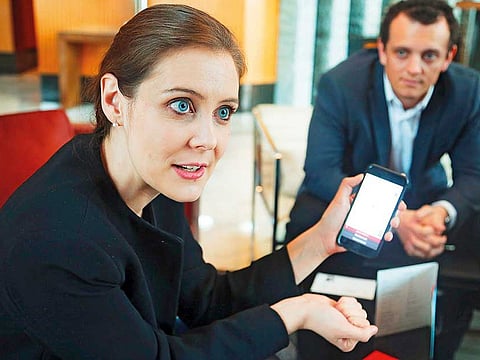Three little words can help you find the way
The new What3words system is more specific than postcodes and simpler to remember than GPS coordinates

Dubai: London-based addressing platform start-up — What3words — has come up with a really easy way to identify any location worldwide and bring precision addressing infrastructure to the market.
Mapping and navigation technology have made huge advances but it is still difficult to identify a specific location despite the geospatial industry worth an estimated $150 billion annually, especially in the desert, as addressing systems don’t offer universal coverage and are often inaccurate.
In simple terms, What3Words is a grid system for the planet. It has split the globe into 57 trillion three-by-three metre squares and every individual grid square has a distinctive name, expressed in three words delineated with dots. The words themselves have no contextual meaning.
For example, the front door of White House is live.linen.slower while Gulf News’ Gate No 1 is crispy.tugging.helm and Gate No 6 is projects.proceeds.mole.
“What3Words is designed to specify locations more precisely than street addresses,” Clare Jones, Chief Commercial Officer at What3Words, said in an interview with Gulf News.
If you’re using the What3Words app on your phone, it will generate the three words for your current location, using GPS.
Deliveries
The company has used 40,000 words in different combinations and in 14 languages, including Arabic recently. It is launched in 170 countries.
Jones said that due to poor addressing, deliveries are missed and friends are not met. It is difficult to memorise string of letters and numbers or long strings of GPS coordinates, but easy if you want memorise three words.
“While GPS coordinates are accurate, communicating long strings of numbers between humans is prone to errors,” she said.
The service can be accessed via the free mobile app [Android and Apple] or online map.
The company makes revenues by licensing the system to companies who have integrated the API into their apps and services by logistics companies, navigation apps, travel guides and NGOs, including offline navigation giant Navmii, postal companies, the United Nations disaster recovery app UN-ASIGN and Norway’s National Mapping website Norgeskart.
In the region, it is used by Aramex, Jaguar Land Rover, Saudi Arabia’s Vanilla and Landmark Hotels to name a few.
She said that instead of using GPS coordinates, which are complicated and difficult to say or remember, Dubai’s Next Future Transportation is using what3words to guide its modular transportation system to the correct pickup and drop-off points.
When relying on traditional addresses, she said that digital maps usually drop a pin in the centre of a building — a spot that would be impossible for a driverless car to get to.
“Around 75 per cent of the world suffer from inconsistent, complicated or no addressing. In the Middle East, we know that e-commerce is a huge industry and it has not reached its potential. You need to address these and people need to get deliveries,” Jones said.
Moreover, she said that countries across the Middle East continue to report an accelerated pace of infrastructure development and urbanisation in light of strategic initiatives like Smart Dubai, Abu Dhabi Vision 2021, Saudi Vision 2030 and Expo 2020.
“The need to deploy accurate and consistent location referencing and addressing has fast become a priority to improve citizen satisfaction, social development and economic diversification,” she said.
Clear vision
She said that Dubai is investing in future technologies such as drones and autonomous cars. So, it needs to have a precise addressing system.
Globally, she said that more than 400 companies and governments are using the system.
Intel Capital led the ‘Series A’ round and Aramex in ‘Series B’ round. The company has so far raised $18 million (Dh66.06 million).
“We have a very clear vision. We want to change the world and make it a less frustrating, more efficient and safer place,” she said.
The company is looking to open offices in Saudi Arabia and Dubai.
Tom Blaksley, Head of Partnerships at What3Words, said that Arabic language glossary was developed by a team of over 30 to 50 native Arabic speakers from across eight countries in the region. The breadth and experience of the team coupled with the hours of rigorous testing ensures that the Arabic language version is clear and intuitive for Arabic speakers across the region.
“The system has built-in error detection. The system works offline without a data connection, ensuring it can be used everywhere,” he said.
The start-up is planning to launch a voice recognition service in the smartphone, wearables and automotive sectors soon — allowing location sharing to be verbal to further increase efficiency.



